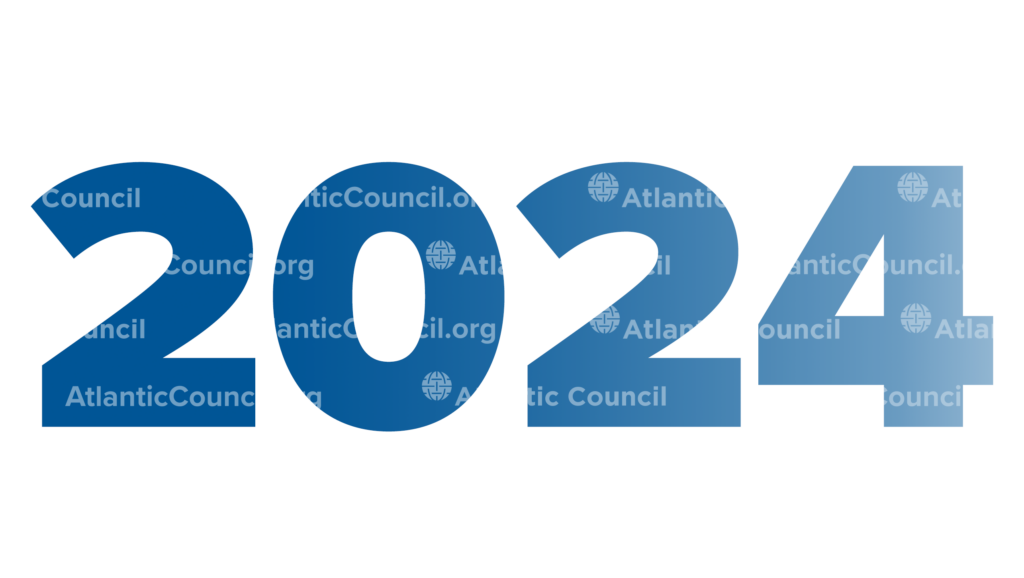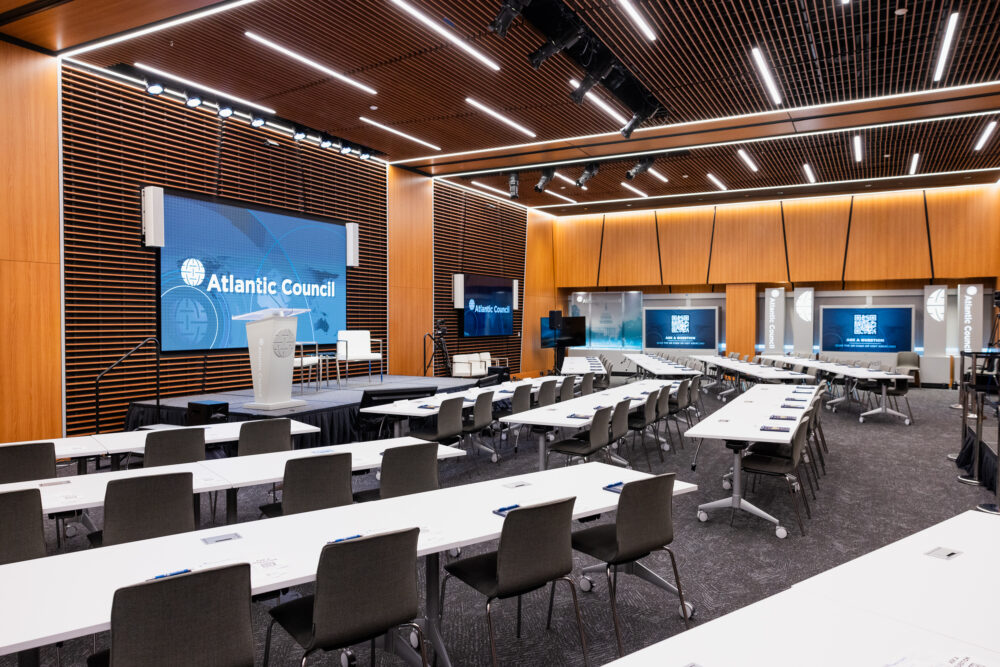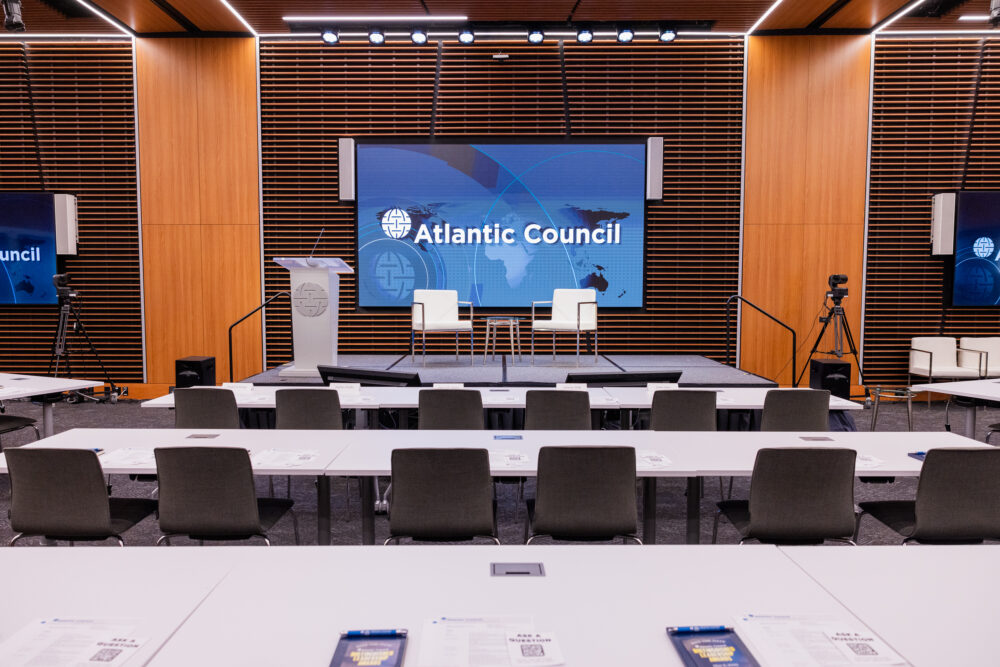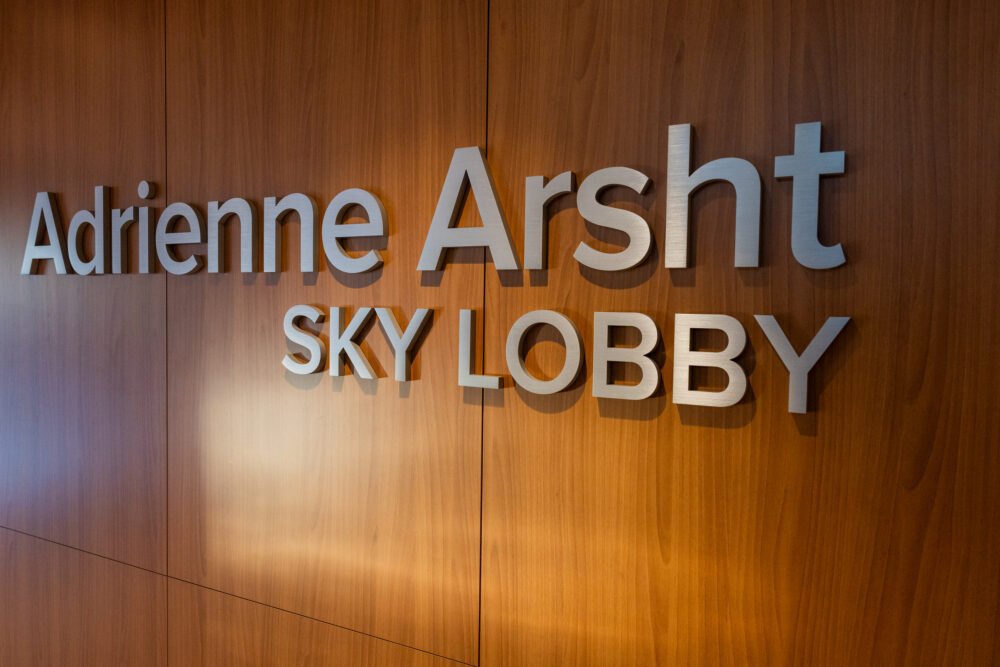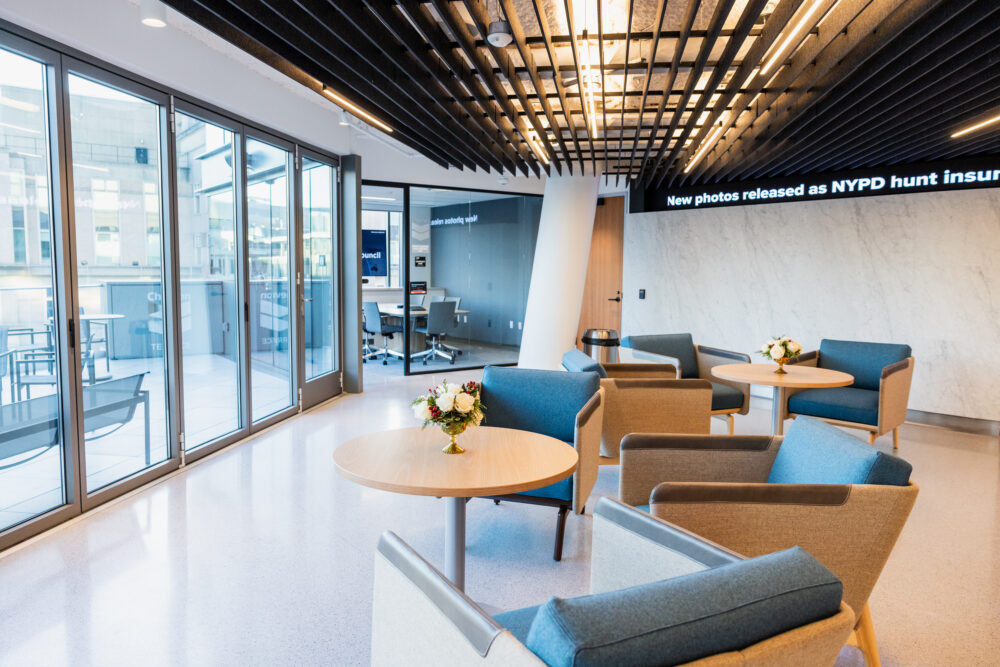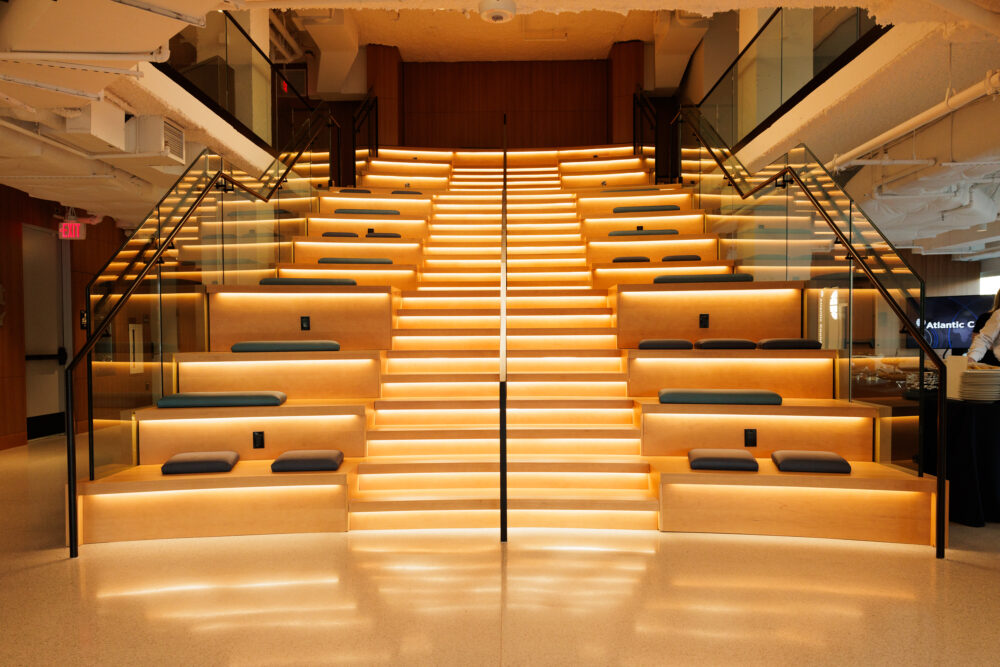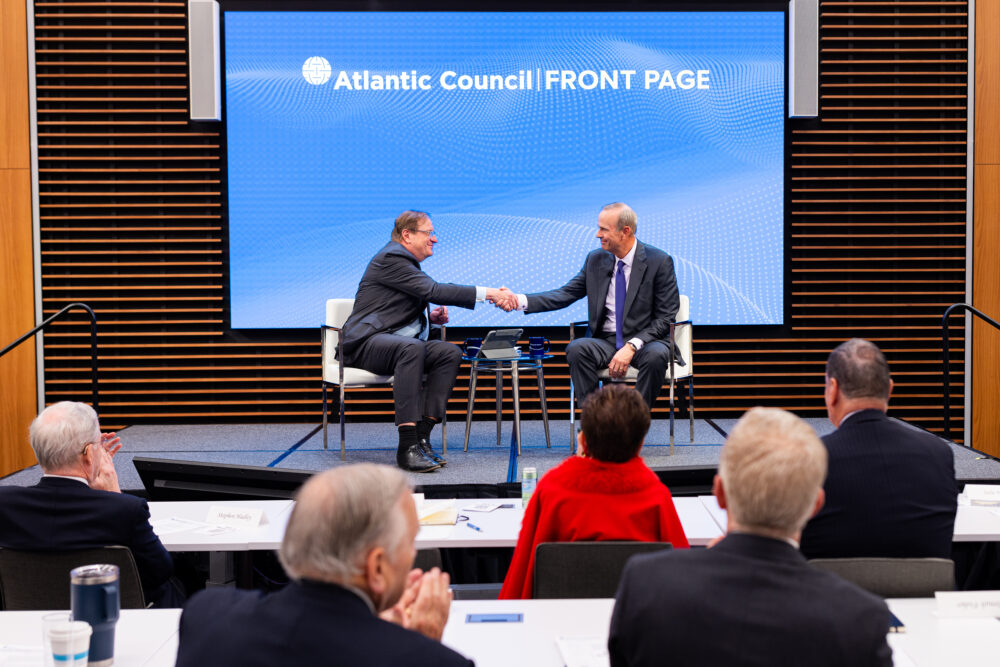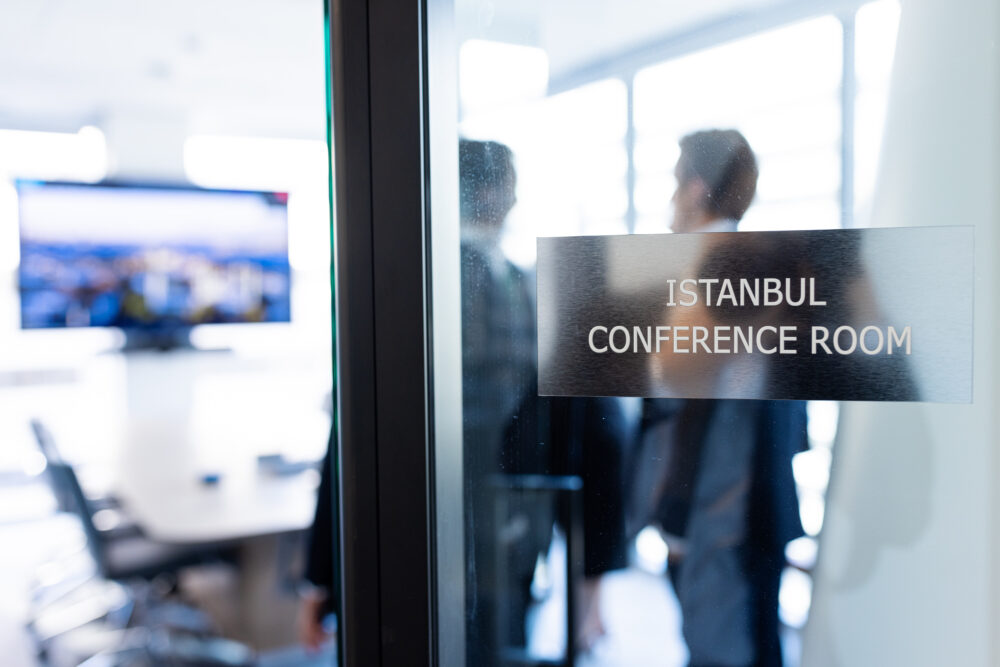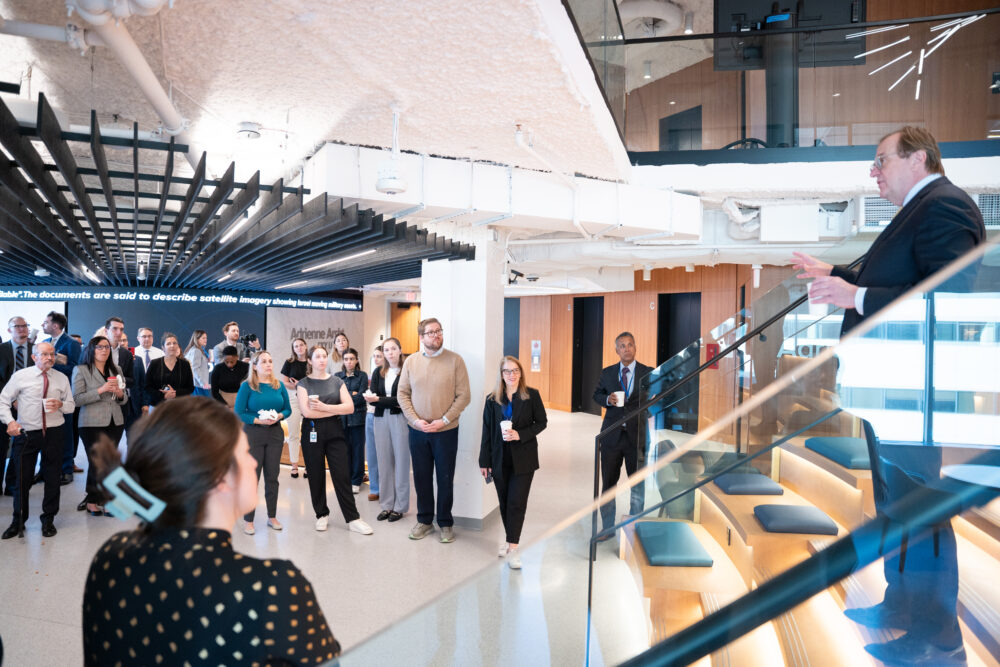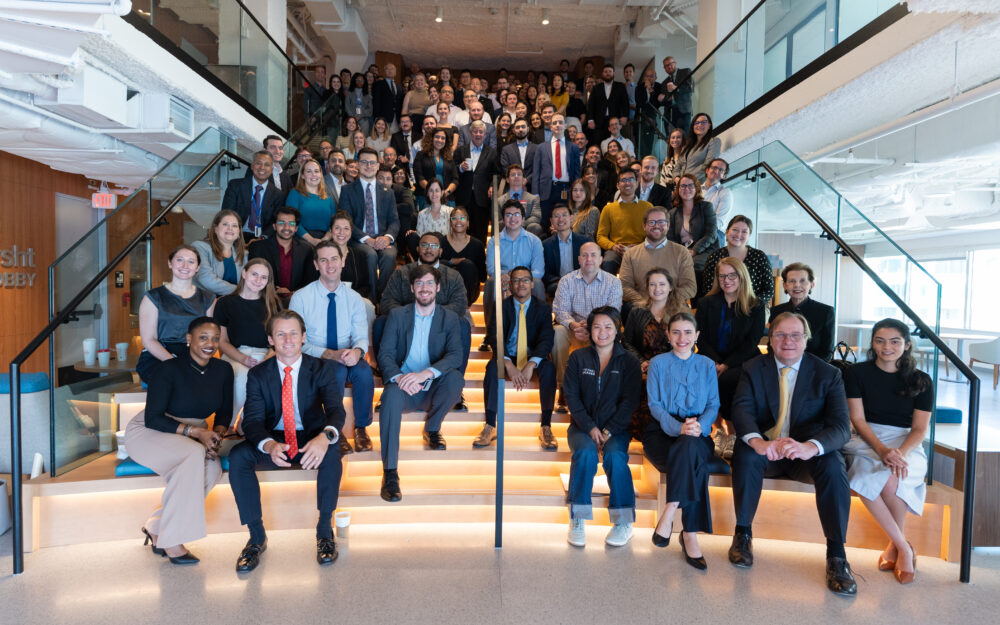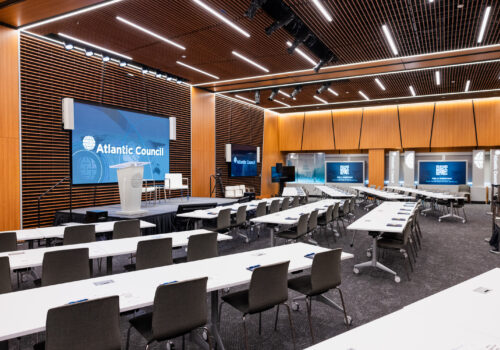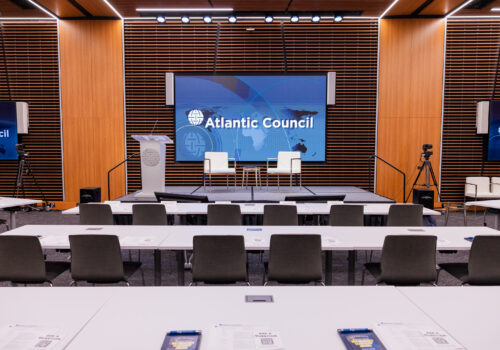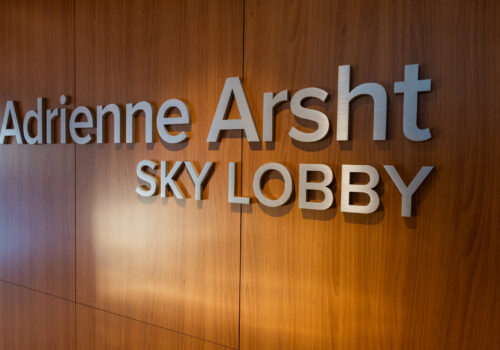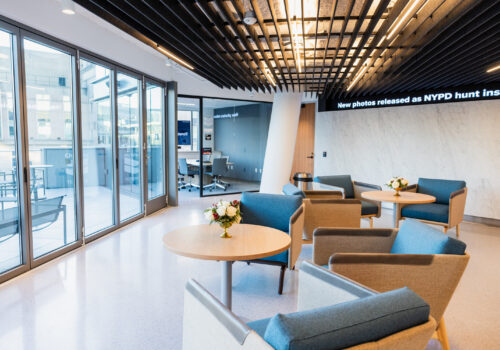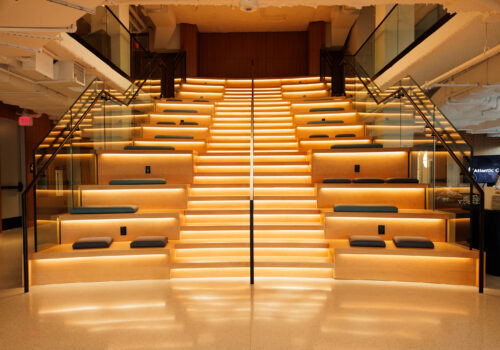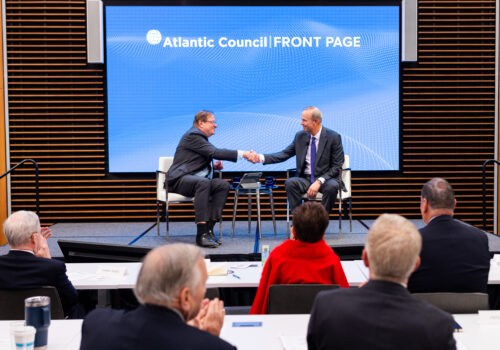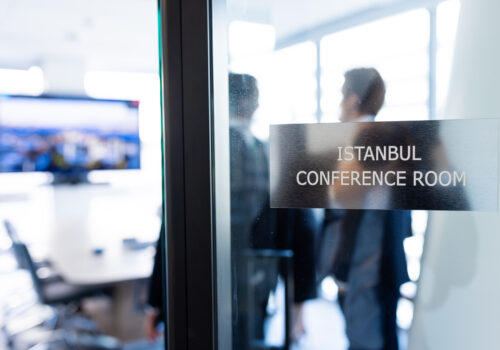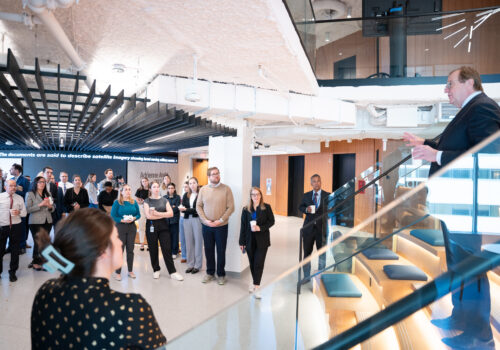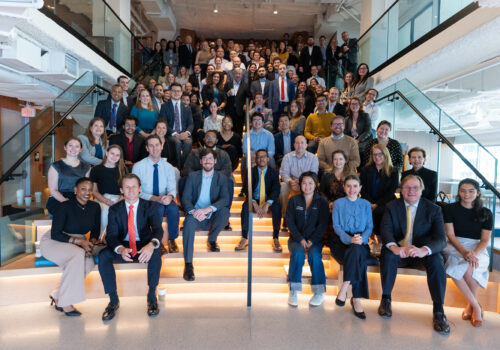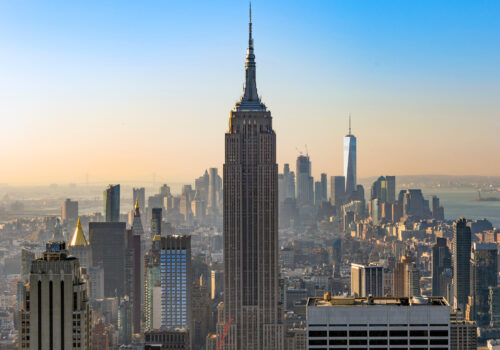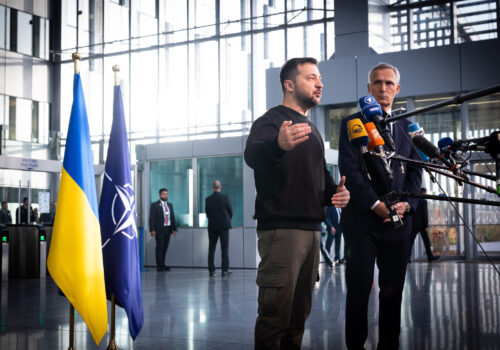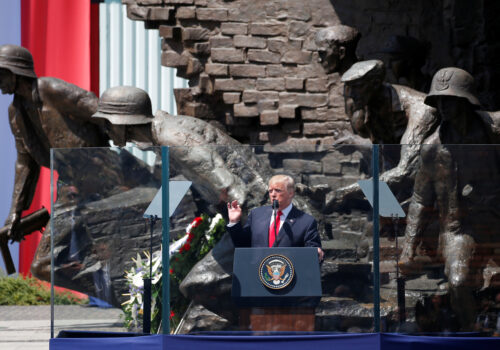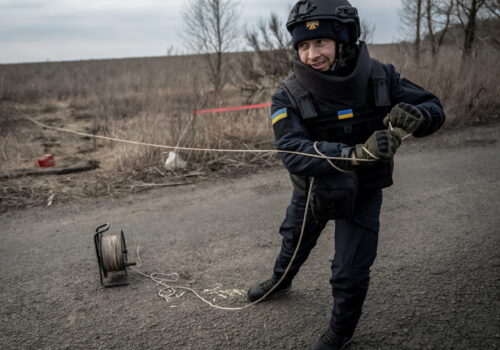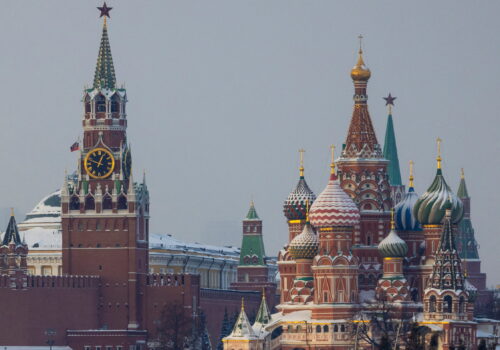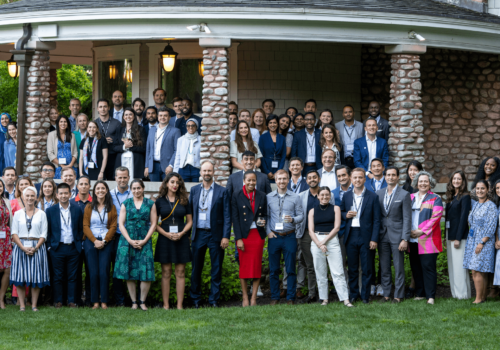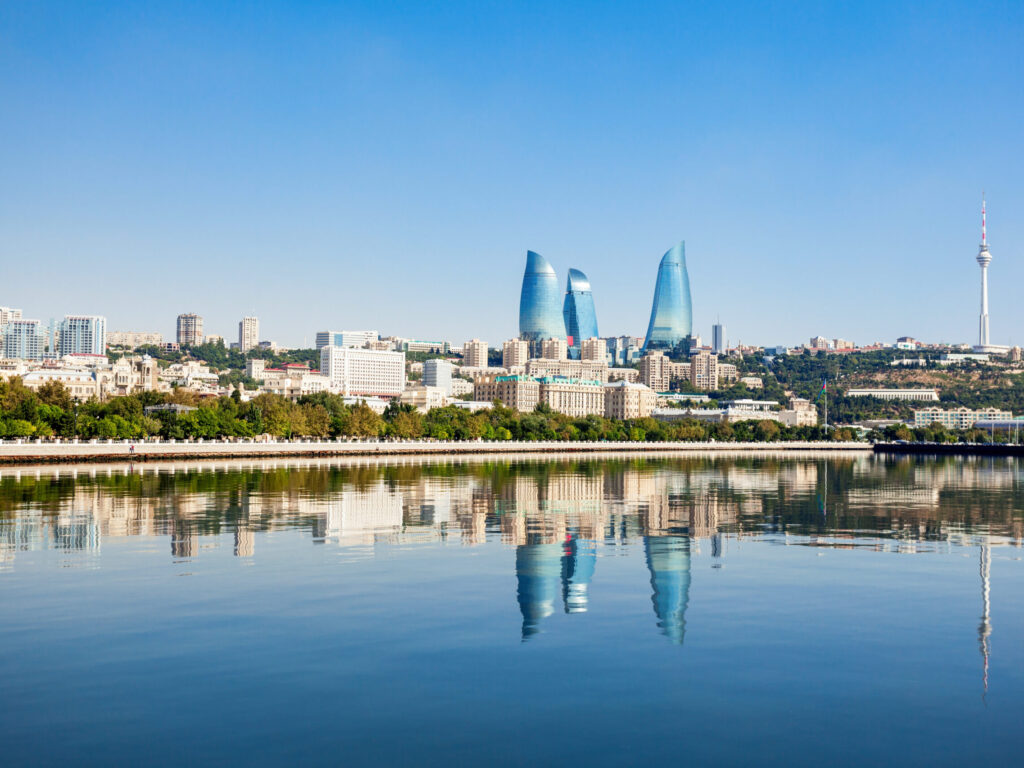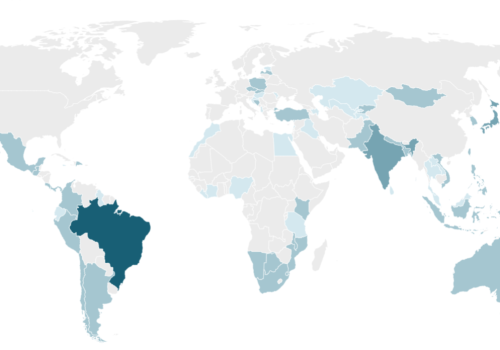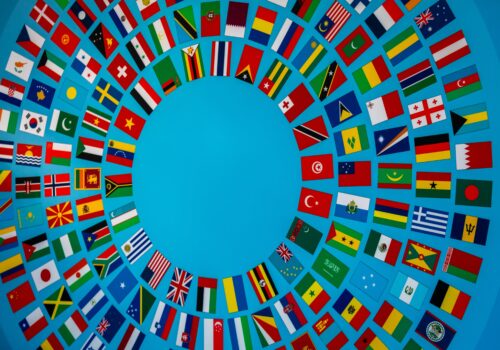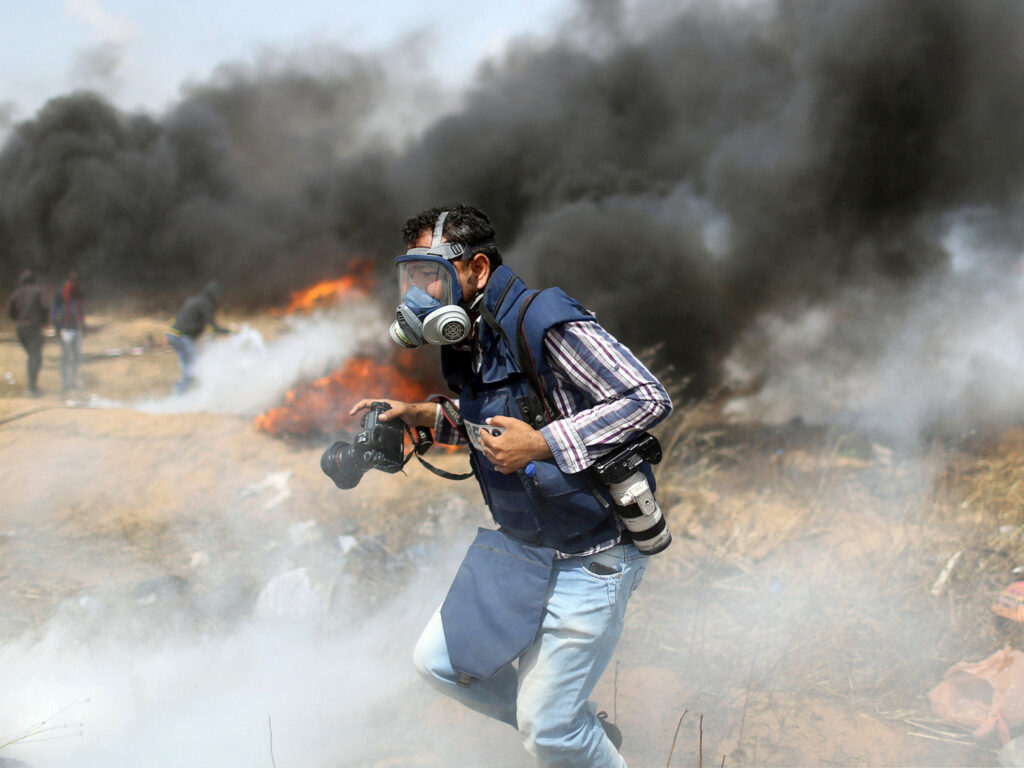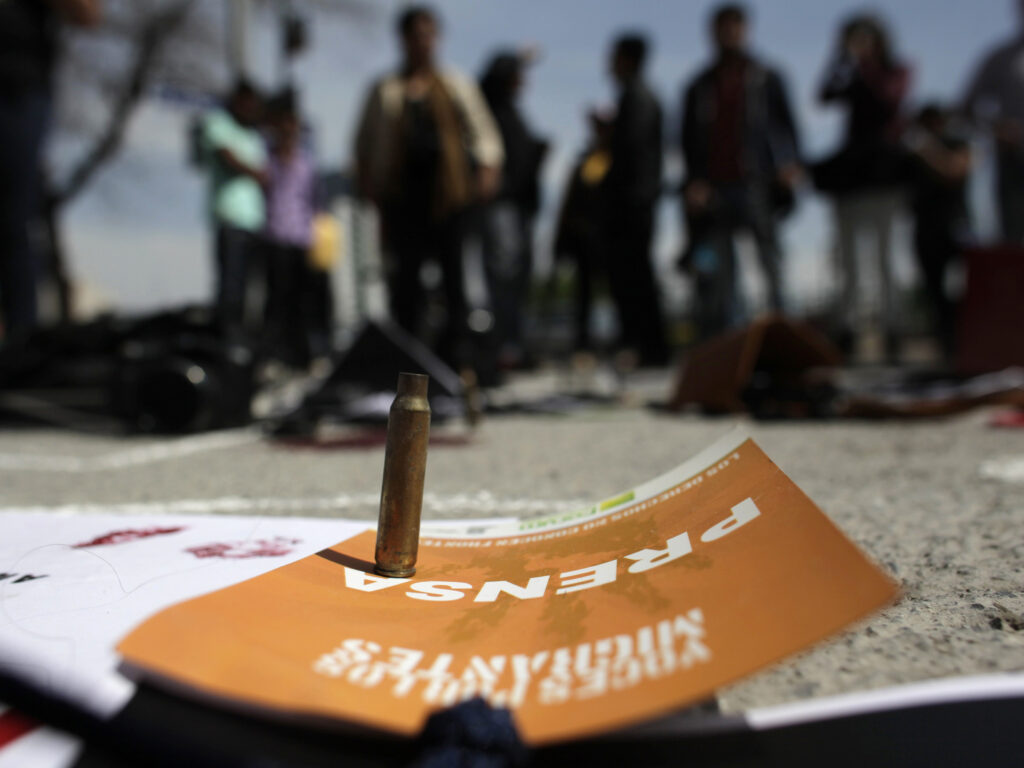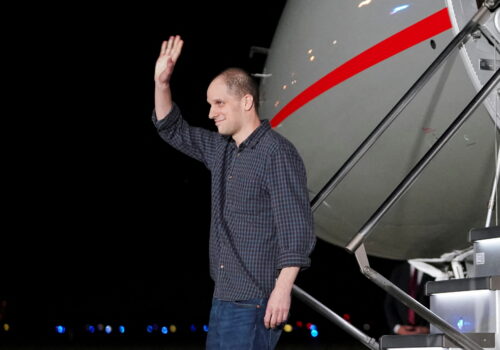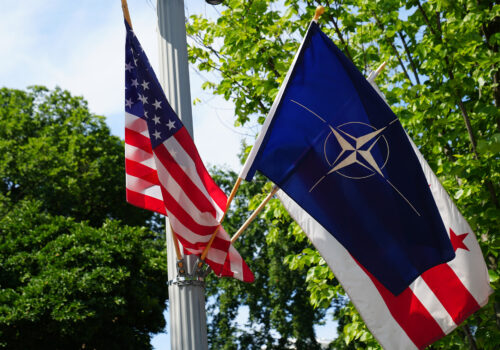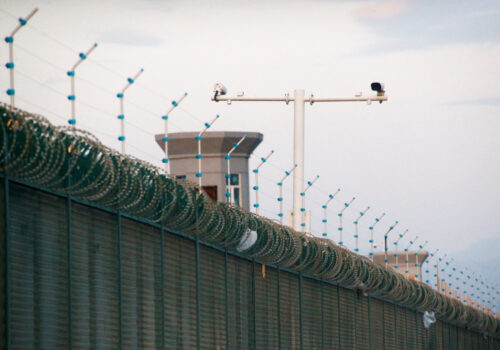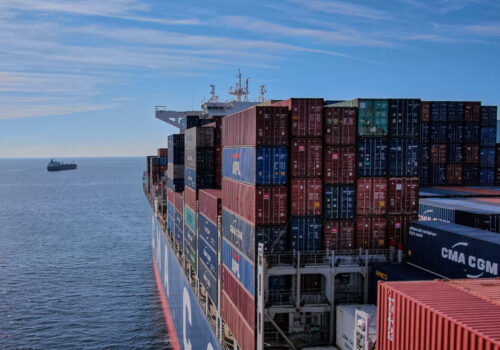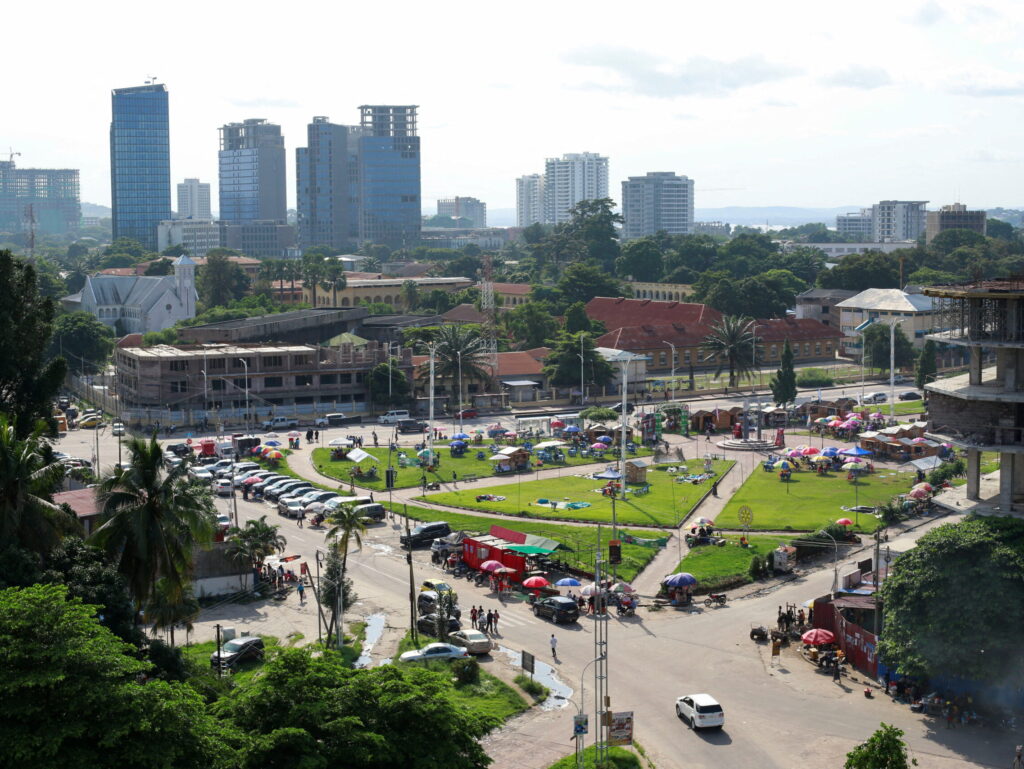If you want to know what sets the Atlantic Council apart, look at the impressive range and quality of work involved in our “greatest hits of 2024,” chosen by managers, editors, and staff from a year’s worth of cutting-edge accomplishments.
It was a year during which wars raging in Europe and the Middle East, tensions growing between China and the United States, and intensifying global competition for the commanding heights of technology increased the demand for our work as well as its urgency.
Our sixteen programs and centers rose to the challenge, meeting the moment with innovative editorial work, blockbuster events, and impactful private convenings. At the same time, we also moved into a new global headquarters, consolidated our global technology work, and focused on “relevance at speed”—ensuring not just the excellence but also the timeliness of our work.
The selection was difficult, and it scratches only the surface of everything we produced last year, but we hope that the picks below hit the high points—not necessarily in order of importance—and are illustrative of the rest.
Click to jump to a greatest hit:
1. Welcome to the Atlantic Council’s new Global Headquarters
2. Staging New York events worthy of ‘the hottest ticket in town’
3. Delivering solutions for Ukraine
4. Fostering the next generation of leaders with the inaugural Millennium Leadership Summit
5. Driving solutions for the energy transition and climate resilience
6. Shaping the global future of AI, together
7. Driving the global economic agenda with unrivaled live events
8. Championing resilience and the fight to free Evan Gershkovich
9. Celebrating NATO’s seventy-fifth birthday at its home in Washington
10. Expanding our global footprint for strategic litigation
11, Delivering relevant-at-speed editorial coverage
12. Drawing a roadmap for nearshoring
1. Welcome to the Atlantic Council’s new Global Headquarters
As one of our board members said to me, “the Atlantic Council now has the home it deserves.”
In November, the Atlantic Council inaugurated our state-of-the-art facility at 1400 L St. NW, Washington, DC. At eighty thousand square feet across five floors, it is nearly double the size of the Council’s previous headquarters. Designed with the latest communication and convening technologies, it was built not as walls to enclose us but as a platform through which we also reach the world.
The Atlantic Council Global Headquarters features numerous convening spaces, an open-air reception lobby, a technology-enabled “situation room” to deal with unfolding crises and scenario gaming, state-of-the-art media studios, more than a dozen programmatic convening spaces, and an outdoor terrace with panoramic views of downtown Washington. The centerpiece of the new space is a three-hundred-seat capacity, multimedia-enabled forum that is among the city’s most dynamic event spaces.
Explore our halls, where named spaces highlight the global scope of our work—from Istanbul to the Caribbean. Original art and displays bring the Atlantic Council’s mission to life, with a few naming opportunities still available.
2. Staging New York events worthy of ‘the hottest ticket in town’
The 2024 United Nations General Assembly week in New York saw the biggest Atlantic Council presence yet—as we hosted a bounty of boldfaced names. It started with the black-tie Atlantic Council Global Citizen Awards, where we honored Ghanaian President Nana Addo Dankwa Akufo-Addo, Italian Prime Minister Giorgia Meloni, Greek Prime Minister Kyriakos Mitsotakis, and CJ Group Vice Chairwoman Miky Lee, with special appearances by Kenyan President William Ruto, Tesla CEO Elon Musk, Pfizer CEO Albert Bourla, and Paramount Global Chair Shari Redstone. Politico called the event “the hottest ticket in town.”
The program continued at the daylong Global Future Forum, where leaders and experts including former US Secretary of State Condoleezza Rice, Emirati diplomatic adviser Ahmed Muhammad Gargash, and Belarusian national leader Sviatlana Tsikhanouskaya discussed the most pressing issues facing the world of tomorrow. Then at the Transatlantic Forum on GeoEconomics, we hosted Deputy Attorney General Lisa Monaco, US Ambassador to China Nicholas Burns, Nasdaq CEO Adena Friedman, and many more high-level speakers to discuss cross-cutting policies affecting finance, technology, and energy. And our Resilience Center took part in New York Climate Week, shaping a climate-resilient world through convenings at the Resilience Hub.
3. Delivering solutions for Ukraine
As leaders in Kyiv and throughout Europe grappled with the third year of Russia’s invasion of Ukraine, the Atlantic Council continued to take the lead in charting the path forward for a secure, free, sovereign, and democratic Ukraine. Ahead of the NATO Summit in Washington, the Scowcroft Center for Strategy and Security held war games to explore Ukraine’s possible future in the Alliance. Following the US election, the Eurasia Center and Europe Center took part in an expert convening at the University of Michigan to develop policy recommendations for the incoming Trump administration on Ukraine. The Global Energy Center, Eurasia Center, and GeoEconomics Center also collaborated on research on the first steps for Ukrainian reconstruction. And the Digital Forensic Research Lab explored how Russia’s information war about Ukraine went global with its annual Undermining Ukraine analysis. But the core problem lies not in Kyiv, but in Moscow. That’s why the Eurasia Center launched its new Russia Tomorrow paper series—all of which ranked among the Council’s most-read longform work of the year—to reexamine Western conceptions of the country and build a stronger policy on Russia today to better prepare for its future tomorrow.
4. Fostering the next generation of leaders with the inaugural Millennium Leadership Summit
In September, the Millennium Leadership Program (MLP) celebrated its tenth anniversary by hosting the inaugural Millennium Leadership Summit, uniting its global network for the first time. The summit brought together members of MLP’s expansive network across twenty-seven countries, allowing alumni and current fellows to connect and collaborate with each other. Participants explored the central theme, “Global Leadership in Times of Uncertainty,” through panels, breakout sessions, and talks from distinguished speakers, including former US ambassador to China and Russia Jon Huntsman; Spencer Stuart CEO Jordan Brugg; and Karen Karniol-Tambour, who is an Atlantic Council board member, Bridgewater’s chief investment officer, and an MLP alumna. Discussions covered topics ranging from the implications of the US elections to strategies for leaders navigating the ongoing evolution of artificial intelligence.
5. Driving solutions for the energy transition and climate resilience
The Council drove the conversations at major climate conferences throughout the year, including New York Climate Week, CERAWeek, London Climate Action Week, and the COP29 climate change conference in Baku, Azerbaijan. The Global Energy Center (GEC) built a “community of communities,” which gathered at these major conferences to advance key emissions reduction initiatives in the energy and heavy industrial sectors. Throughout, GEC drove thoughtful, ambitious, and pragmatic industry/policy collaboration on financing methane abatement, carbon accounting, and building the business model for emissions reduction in hard-to-abate sectors. Meanwhile, GEC’s Nuclear Energy Policy Initiative continued its field-leading work on nuclear power with the Frontiers Project Meeting in Park City, Utah, addressing Utah’s tremendous potential as a first-mover state into advanced nuclear energy technologies to help secure US leadership in meeting global demand for low-emissions production and manufacturing.
The Atlantic Council’s Climate Resilience Center also continued its cutting-edge work on heat and climate adaptation. Through the Resilience Hub, which is recognized as the leading space for conversations on adaptation and resilience, the team held important convenings at the COP16 summit on biodiversity, COP29 in Baku, and beyond.
6. Shaping the global future of AI, together
Artificial Intelligence (AI) is projected to contribute $19.9 trillion to the global economy and 3.5 percent of global gross domestic product by 2030. As world leaders grapple with the implications of this emerging technology, we raised our ambitions by establishing the Atlantic Council Technology Programs (ACtech), bringing together five innovative existing programs under one umbrella. ACtech’s field-leading work on AI—which is only one aspect of the programs’ wide-ranging portfolio—was evident throughout the year. The GeoTech Center’s AI Connect program is dedicated to building communities of action to ensure AI opportunity is truly global, setting inclusive AI standards, enhancing nations’ competitiveness, and fostering regional collaboration on robust AI strategies. In 2024, AI Connect expanded with 150 policymakers from fifty-five global majority countries and workshops in Ho Chi Minh City, Istanbul, and Cape Town. While AI has the potential for enormous good, its rapid innovation and deployment also carry major risks. The Cyber Statecraft Initiative published a first-of-its-kind report entitled “Hacking with AI,” the Digital Forensic Research Lab monitored the misuse of generative AI in global elections, and the Democracy + Tech Initiative led work in AI national security governance as the Biden administration released the national security addendum to its landmark AI executive order.
7. Driving the global economic agenda with unrivaled live events
At the International Monetary Fund (IMF)-World Bank Annual Meetings and spring meetings, our GeoEconomics Center was the only think tank to host events live from inside the IMF’s headquarters. From our IMF studio to Atlantic Council headquarters, the first names in finance—including IMF Managing Director Kristalina Georgieva, European Central Bank President Christine Lagarde, and US Trade Representative Katherine Tai—sought out the Atlantic Council audience. These convenings shaped policy debates on a range of issues where the GeoEconomics Center is at the cutting edge, including digital assets, economic statecraft, and the state of the Chinese economy.
8. Championing resilience and the fight to free Evan Gershkovich
Throughout the year, the Atlantic Council, in collaboration with Executive Vice Chair Adrienne Arsht and Wall Street Journal publisher and Dow Jones CEO Almar Latour, fought to free Wall Street Journal reporter Evan Gershkovich from Russian imprisonment following his 2023 arrest on false charges of espionage. Publicly, our major event series, “Reporters at Risk,” convened leading journalists and media professionals from around the world to discuss the dangers that reporters face in their work and the importance of supporting press freedom and security. Privately, we fostered relationships that proved vital for Evan’s release, including at the Global Citizen Awards dinner in September 2023, where we introduced German Chancellor Olaf Scholz, one of our honorees, with Evan’s parents. There, Scholz indicated his support for Evan—a gesture of solidarity that would underpin Scholz’s decision a year later to free Russian hitman Vadim Krasikov from German jail as part of a sprawling seven-country deal involving Evan and some two dozen other prisoners. These efforts were a major focus of the newly launched Adrienne Arsht National Security Resilience Initiative, which aims to elevate resilience as an integral aspect of national security discourse and decision-making in Washington and around the world in the years to come.
9. Celebrating NATO’s seventy-fifth birthday at its home in Washington
This was an important year for NATO, as it celebrated its seventy-fifth anniversary as the world’s most successful military alliance and gathered in Washington for its annual summit. The Scowcroft Center’s Transatlantic Security Initiative played a leading role in shaping NATO policy during this critical time through its “Season of NATO”—a series of public and private engagements, events, and publications, culminating in the NATO Public Forum at the Washington summit. As one of the lead organizers of the Public Forum, the Atlantic Council played a direct role in shaping and leading the critical conversations facing the Alliance. This included hosting sessions with then NATO Secretary General Jens Stoltenberg, US Defense Secretary Lloyd Austin, and National Security Advisor Jake Sullivan, as well as panels with the foreign ministers of Iceland, Poland, and Lithuania; the defense ministers of Canada, Finland, Norway, and Sweden; and Saab CEO Micael Johansson. We co-hosted a reception with the British Embassy, Amazon Web Services, and Dataminr, and held numerous off-site events, including a panel with the foreign ministers of the Nordic-Baltic countries. We topped it off with a unique musical performance by NATO allied musicians with the American Pops Orchestra at the Library of Congress. As several US and allied officials mentioned, “the Atlantic Council was everywhere.”
10. Expanding our global footprint for strategic litigation
In 2024 the Atlantic Council’s Strategic Litigation Project (SLP) expanded its regional portfolio, ensuring that impacted communities are driving the design and implementation of the team’s projects to advance human rights and accountability around the world. The team’s network of fellows, advisors, and partners represent affected communities from Afghanistan, Syria, Iran, Venezuela, Sri Lanka, Ukraine, and beyond. In particular, SLP’s work on Uyghur issues in China, developed and led by Uyghur human rights lawyer and advocate Rayhan Asat, saw remarkable growth and impact last year. The SLP also hosted a high-level panel event in New York City in partnership with the International Peace Institute and the Malala Fund, featuring Nobel Peace Prize Laureate Malala Yousafzai, to discuss the urgent need for legal recognition of gender apartheid in Afghanistan.
11. Delivering relevant-at-speed editorial coverage in the Middle East and beyond
2024 was a year of history in motion, and the Atlantic Council’s experts kept pace with it. This “relevance at speed”—in which we act on major developments in the world with the velocity of a news outlet but draw on the Council’s uniquely deep and broad expertise—sets us apart as an organization that is as smart as it is fast. But we don’t practice relevance at speed just to be different; we do it because the United States and its partners and allies must respond to fast-moving global events as they unfold, so we just as swiftly must equip our audience of world leaders and policymakers with the most authoritative insight, foresight, and recommendations. Nowhere was this more evident than in our wide-ranging, lightning-quick coverage led by the Rafik Hariri Center and Middle East Programs of this past year’s momentous upheaval in the Middle East, including the ongoing war in Gaza, the expansion of the conflict into Lebanon, Iran’s direct attacks against Israel, Israel’s assassinations of Hezbollah and Hamas leaders, and the fall of the Assad regime in Syria. Our Fast Thinking newsletter proved ever more popular, our Experts React editions became some of our most-read articles of the year, and our “Smart in 60 Seconds” series won a Telly Award for excellence in video and television. These rapid responses also resonated with the media, with the Atlantic Council receiving well over one hundred thousand global media mentions in 2024—and most mentions in top-tier outlets stemming from our Middle East work.
12. Drawing a roadmap for nearshoring
What is a policy opportunity that gets a lot of attention but lacks a roadmap to achieve it? The Council’s Adrienne Arsht Latin America Center identified nearshoring, or the relocation of supply chains to the Americas, as one such opportunity, and launched a multi-year working group with private-sector and former public-sector representatives from the United States, Mexico, Central America, and the Dominican Republic to figure out how to turn rhetoric into reality. We don’t operate in a silo, so feedback from current officials was critical. The group’s first report, which also incorporates insight from the GeoEconomics Center, was circulated across US missions and in relevant ministries as it offers the first concrete toolkit for how the United States and specific regional countries can bring more investment closer to the United States. Words are not meant to stay on paper. That’s why it was critical to have support in the paper from Republican and Democratic offices in the US House and Senate, and to see that it’s helping to inform Guatemala’s strategy to attract investment. The report’s thesis that deeper economic engagement with the region will also help to advance US economic security will continue to drive the working group’s efforts in the new US administration. It’s this sort of work that has made the Adrienne Arsht Latin America Center the pre-eminent player in its field.
13. Revealing how freedom fuels prosperity
Economic downturns, geopolitical tensions, and global pandemics have prompted many governments to expand their authority, trading fundamental freedoms for security imperatives. But many believe this model of governance is not sustainable to long-term prosperity and economic development. The Atlantic Council has been buttressing that conviction with research and, most importantly, data through the ground-breaking indexes of its Freedom and Prosperity Center. Featuring twenty contributing authors and a foreword by 2024 Nobel Prize winner Daron Acemoglu, the Center’s first annual atlas examines the trajectories of eighteen different countries and regions, providing a data-driven analysis of freedom, security, and prosperity in an interconnected world. The result? Their findings show that in all regions of the globe, countries that prioritize the rule of law, transparency, and accountability in governance foster an environment conducive to sustained economic growth and prosperity.
14. Driving investment, peace, and security in the DRC
In October on the margins of the IMF-World Bank Annual Meetings, the Africa Center in partnership with Rawbank hosted the first DRC Day at the National Press Club, bringing together representatives from the public and private sectors to forge solutions for the Democratic Republic of the Congo’s most pressing problems, including strengthening governance and unlocking investments for critical minerals. Speakers included Africa Finance Corporation CEO Samaila Zubairu, DRC Minister of Finance Doudou Fwamba Likunde, and US Export-Import Bank President Reta Jo Lewis. It was a high point during a year that included deep work on everything from critical minerals to creative industries.
There was so much more that the Atlantic Council delivered during the year, with its focus on the people, forces, and ideas shaping the global future. Here is a sampling of other notable work.
Setting a transatlantic policy agenda for 2025, with the Transatlantic Horizons series.
Influencing the Biden administration’s nuclear weapons policy with fresh thinking.
Convening leading voices and deploying expert insight on the 2024 “superyear” of elections in the United States and around the globe.
Putting the energy transition at center stage in Istanbul at the Atlantic Council Regional Conference on Clean and Secure Energy.
Mapping the tentacles of global spyware with a groundbreaking report.
Shaping the future of US policy with the Iran Strategy Report.
Examining China’s emergence as a peer nuclear power through a tabletop exercise and report on a potential conflict.
Enhancing US and allied preparedness for deterrence and war in the Indo-Pacific through the Tiger Project.
